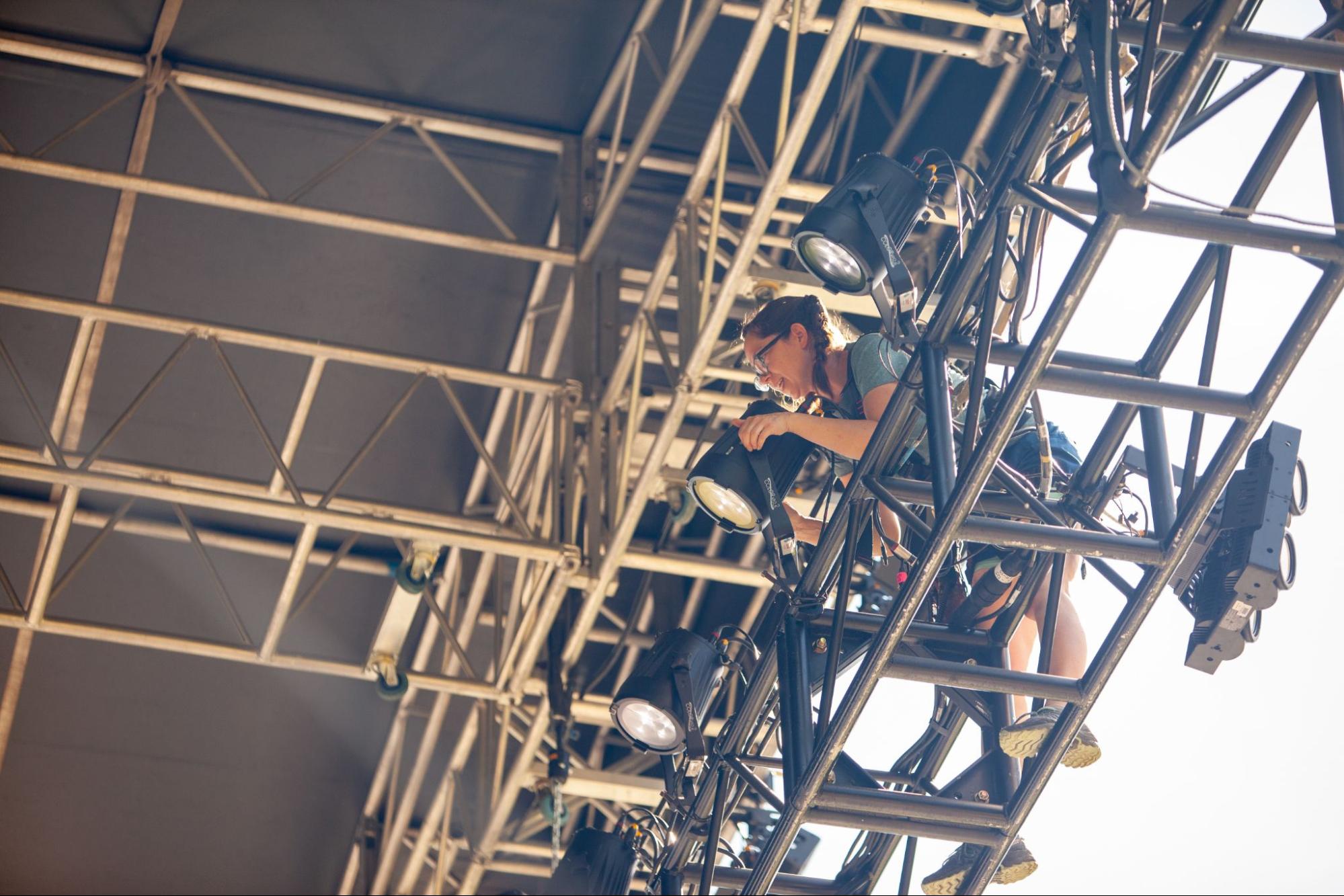Whether it’s your first event or your hundredth, event planning is stressful. So stressful that event planning is often considered one of the world’s most stressful professions.
That’s why Eventbrite has created some great resources that can make the whole process easier. In addition to digital marketing tools like MailChimp and Zapier, we also have handy reference guides about getting more out of your event budget and planning your festival operations to help you find some calm amidst the chaos.
And, when you need to make sure nothing slips through the cracks, using this planning an event checklist could save the day. Use it at any point in the event planning process to reduce stress and ensure no detail is forgotten.
Make creating your event plan less stressful with this ultimate event checklist!

Start as early as possible
As soon as you’ve got the green light on your event (and sometimes even before), you need to get to work — fast. The sooner you can land on a date, the better! At the very minimum, start the tasks listed below four to six months before your event takes place.
1. Establish your goals and objectives
First, you’ll want to set some goals. Experienced event planners use these to help guide the rest of the event planning process and provide something to measure success against. You can set goals by asking yourself a few questions:
- What is your event’s purpose? This is the core reason you’re creating an event in the first place. Whether it’s a corporate event or a birthday party, you must know why you’re putting it on. Knowing this will help you answer the rest of the questions on this list.
- How many people do you want to attend your event or watch your live stream? This will help you determine the size of your venue and the amount of promotional activity you’ll need to do.
- How much profit do you want to make? You’ll want to set your ticket prices based on this goal and the number you’ve set for attendance goals.
- How much will tickets cost? After deciding on the desired profit margin, the next step is to establish appropriate ticket prices. These prices will not only determine the financial aspect but also play a crucial role in determining the accessibility of your event to the target audience.
- Where will your event take place? To achieve the above-mentioned goals, carefully assess the essential qualities your venue must possess. Determine the priority of various aspects of the venue that will be most significant in supporting your objectives.
2. Put together a rough budget
Here are some top tips from our experienced event planners on how to put budgets together:
- Borrow similar figures from past events for a baseline: Examine the costs of previous events and consider whether these expenses will be altered based on the differences in your upcoming event. If this is your first time throwing an event like this, consider reaching out to people who plan similar ones by searching for them on Eventbrite.
- Fill in the gaps with educated guesses: Call some vendors to get multiple estimates and try to do some back-of-the-napkin math on your estimated costs. Call around to get opinions from event organisers who have thrown similar events, too.
3. Select a date
Experts know that an event’s date can be the cause of its success or failure, so be sure to get it right!
- Choose an optimal date and a second-best (for backup) when getting sign-off: Depending on the size and scope of your event, you’ll probably want to coordinate the date with other events or seasons.

4. Choose a location, a venue, and vendors
Event planners consider these to be some of the most critical choices in the early stages of event planning, so be sure to give these questions serious consideration:
- What geographic area is best for your event? The location you select for your event, whether a country, region, city, or neighbourhood, will impact the accessibility for attendees, the cost and time required to reach the location, and the availability of vendors.
- How many people will be attending your event? You may have an attendance goal but try to be honest when estimating how many attendees you can expect.
- Do you need to provide Wi-Fi? Some event venues may not provide their own, which could be an important factor in narrowing down your search.
- Does the venue have the infrastructure you need? The venue will likely need power outlets, audio/visual equipment, and seating.
- Are there local vendors you can rely on? Depending on the nature of your event, you may need caterers, florists, photographers, sound technicians, etc. You’ll need to do some research, as it’ll be in an unfamiliar area, and see if you can get some recommendations through your network.
5. Pick a theme
It can be hard to decide on a theme for your event, so here are some tips from our experts on how to decide on yours:
- Review your goals & audience: Think about how your goals and your audience will affect your chosen theme. For example, if your guests are little kids and your goal is to entertain them at a birthday party, a black tie theme might not be appropriate. That’s unless there’s a secret agent theme, of course!
- Decide on your event’s theme: Ask yourself if your event’s theme will have cultural, historical, or seasonal relevance. How can the theme tie into other aspects of your event?
6. Research speakers
Event planners know that speakers can add tremendous value to an event, so here’s how to be sure you pick the right people for yours:
- Researching speakers who have spoken at similar events: What topics have they discussed? Review the speakers’ websites and social media accounts. Are there any other speakers from those events you want to keep an eye on?
- Compile a list of your ideal speakers: What do you want each speaker to bring to your event? Consider their backgrounds, level of expertise and any unique talents they may have.
- Solidify your ask: Prepare to provide your offer for their speaking fee, and assemble a list of benefits to them, such as the reach and exposure it will provide.
- Reach out to your speakers: Draft a professional email and offer to answer any questions they may have.

7. Start your sponsor search
Your event’s finances might depend on your sponsors, so follow these best practices to make sure you hit your financial targets:
- Determine what kind of activations you can offer: Find out which activations your sponsors may be interested in, such as product demos, logo placements, or exclusive VIP experiences.
- Research sponsors who’ve partnered with events similar to yours: Create a list of these sponsors, including their contact information and any other details you may need to help your case.
- Compile a list of your ideal sponsors: Make sure your list expands beyond just the sponsors who have partnered with similar events. Get creative and think outside the box to find potential sponsors other similar events haven’t gotten yet.
- Determine the market rate of your sponsorship packages: Research what other events in your area are charging and use that to set a fair rate for each package.
3 months out: planning the nitty gritty
Once you’ve sketched out your event, you need to keep your budgets updated with the latest estimates and quotes. Dedicate 10 minutes daily to this work as you check the details below, and you’ll get a clearer picture of your expected revenue.
The tasks listed below should be tackled at least 2-4 months before your event.
8. Finalise your speakers
With enough experience, every event planner has had issues with finalising speakers, so here are some steps to take so you can make sure you can avoid any problems:
- Book your speakers: Verify with your speakers and make sure their paperwork is signed as far ahead of time as possible.
- Balance your lineup: Look at your final list of speakers and consider the type of information and format each one offers. Schedule them so there’s a variety of speakers and formats evenly spread throughout the event.
- Get bio information and photos: Verify with your speakers what headshots they prefer and request their biographic information.
- Arrange travel and accommodation: Professional event planners will do this ahead of time to save money and can even get discounts by booking all the speakers into the same accommodation.
9. Organise your financials
You’ll need to get your finances straight to prove your event’s success, so here are some tips from professionals on how to do that as well as possible:
- Choose your ticketing or registration technology: Tools like Eventbrite make tracking your guest list and ticket sales easy.
- Finalise sponsorship contributions: Try to finish your paperwork as early as possible, and consider giving discounts to sponsors that pay upfront.
- Set your ticket prices (VIP, GA, etc.): Look at the ticket types that similar events offer. Try to make sure your VIP packages have even more to offer attendees to make them as enticing as possible. Professional event planners will ensure VIPs have meet-and-greets, permission to enter special areas, and even unique swag to take home.
10. Build your website
A good website can give your event a more professional look, so here’s how to make sure you give a great first impression with yours:
- Get sign-off on the look and feel: Make sure everyone involved in marketing the event has the same idea for the look and feel your website should have. Professional event planners will coordinate with web designers, graphic designers, photographers, and copywriters to ensure consistency.
- Update your site or build your new event’s site: If you have a recurring event, you can use the same website as the last time, but be sure to update all the information for accuracy.
- Make sure your website infrastructure can handle the increased traffic: Before you start marketing your event, make sure your web designer understands the number of visitors you can expect. That way, the rush of signups can go without a hitch.
- Ensure your website is mobile-optimised: Almost 50% of web traffic is on mobile phones, so most of your target audience might never see the desktop version of your site.

11. Begin to promote your event
Event promoters don’t just rely on one method for their marketing efforts, and neither should you:
- Develop messaging documents that are aligned with your event’s brand: Make sure to follow the voice and tone of your event’s brand to keep your marketing plan consistent. To distribute that messaging through one platform with a unified voice, you can use a platform like Eventbrite’s event marketing tools.
- Utilise digital marketing tools and social media: Tools like MailChimp and SurveyMonkey are great for promoting your event and tracking attendee behaviour. Eventbrite lets you improve your social media ad performance, identify and target the right audience, and automate your email marketing.
- Distribute your event on online event calendars: Online event calendars automatically distribute your event to the most relevant places for your audience. By letting you sell your tickets directly on a variety of websites, calendars like Eventbrite boost your ticket sales while making the process simpler.
- Write blog posts about your event: Blog posts are great ways to give your audience essential information and naturally attract them to your event’s website without paying for advertising. Just make sure your blog post leads directly to your event page on a platform like Eventbrite so they can take action as soon as they’re interested.
- Create a promo video: A great promotional video is a memorable way to explain everything about your event in a concise and entertaining format. You can add it to your other marketing efforts by including it in blog posts, social media posts, and emails. But if you put in all that effort, don’t forget to distribute it as widely as possible through Eventbrite Ads and other event promotion tools
12. Finalise venue details
If you want to create seamless event experiences like the best in the business, here are some industry best practices for finalising the details:
- Work with the caterer on approving a menu: Consider likely dietary restrictions, whether you can make your menu match your theme and the number of people you’ll have to feed.
- Secure A/V equipment: Microphones, speakers, projectors, and lighting equipment are just a few of the most basic equipment you might need.
- Review security needs and plan: If your event has celebrities, even in a narrow niche, you may need more security than you think to ensure they can get where they need to go quickly.
- Investigate for any special permits, licenses, insurance, etc.: Depending on your event, you may need permits, licenses, and insurance for serving alcohol, serving food, any interactive components, or other contingencies.
- Determine event signage and attendee communication plan: Put yourself in the place of an attendee coming into town for the first time for the event, and consider what types of signage they’d need to find parking, the entrance, and any other important points.
13. Draft a schedule
Event planners often seem like they live with a schedule in their hands, so here’s an important tip on drafting your own:
- Put together a working draft of your event’s schedule: Consider making different versions of the schedule for people managing specific tasks — the security guards may want to focus on what times VIPs and attendees enter, whereas other crew may want to focus on setup and cleanup times.

2 months before: finalising the details
Your event is in sight, and the days are flying by. Here’s what you need to keep at the forefront of your mind two months before your event.
14. Send reminders
Professional event planners will send reminders to various people a couple of months before the event. Here are some of the different people you should be sure to keep in touch with:
- Attendees: Attendees may need reminding so they don’t miss the big day or need more information about the event. Send reminders with all the necessary details, such as date, time, and location.
- Vendors: Similar to attendees, vendors may need reminders or follow-ups on logistics like setup times and parking availability. Sending reminder emails can help ensure smooth operations when it comes to vendor management.
- Presenters/speakers: Your presenters and speakers should clearly understand their role in your event. Send reminders about their participation with all the necessary details, such as when to arrive, what equipment will be provided, and any specific instructions.
- Sponsors: Remind your sponsors about the exciting brand activations they’ll get soon, and they may help promote your event to their own audiences.
15. Push promotions to meet your sales goals
If you’re struggling to hit your sales goals, don’t panic. It happens to the best of professionals, which is why they create promotions like these:
- On social media: Use different social media platforms to target different audiences — Instagram tends to have younger users, while LinkedIn skews toward businesspeople and a more mature demographic.
- On your blog: People reading your blog are already interested in what you have to say, so they’ll be more likely than most to buy tickets to your event.
- Via email: Email allows you to send more personalised messages to people you think would love your event, so make sure to use it to reach out to them.
- Via paid advertisements: You can advertise through social media, trade magazines, billboards, or any medium that you think would reach the audience you’re trying to bring into your event.

1 week before: tying up loose ends
In the week leading up to your event, there’s a lot of last-minute wrangling. Here’s what you need to keep track of to stay on top of your to-do list.
16. Finalise the event schedule & scripts
Even the most experienced event organisers will have to make last-minute changes if something unexpected comes up, so here are a couple of considerations to consider on your event schedule and scripts:
- Make sure everyone has the same schedule: If you need to make last-minute changes, make sure everyone’s on the same page. The last thing you need is someone referencing an old schedule!
- Get sign-off on any speech scripts: What your speakers say will reflect on your brand, so make sure you approve the scripts of any keynote speeches.
17. Update everyone with final registration numbers
A hallmark of a great event creator is good communication, so make sure to keep these people updated on your final registration numbers:
- The caterer: Your caterer needs to know the exact number of people they’ll need to feed, so keep them updated even if you get a last-minute rush of attendees.
- The venue: Venues have insurance and legal restrictions for audiences of different sizes, so make sure your venue knows how many people you’re expecting, especially if there’s a dramatic change.

18. Confirm timings
With only a week before the event, professional event planners will solidify when each vendor is due to arrive. Here’s who to check in with:
- The caterer: Your caterer will need time to prepare the food and set up serving stations, so make sure they can get into the venue when needed.
- A/V equipment: A/V equipment needs to be tested and set up in advance, so confirm a timeline with your AV provider.
- Decorations: Depending on the complexity of your event, decoration might only take a couple of hours, or you might need to begin setting up a day in advance.
- Speakers: Keep in contact with your speakers to hear about if they’re experiencing any travel delays or anything else that would keep them from showing up on time.
The day before
If you’ve followed the above steps in our event guide, you’ll hopefully feel calm and prepared the day before your event and ready to enjoy the fruits of your labour. The only things left to do are:
- Ensure that your venue is set up for the event and that you have printed copies of the schedule and any speeches.
- Send one final message to your attendees, reminding them of the event’s time and location. If it’s being held online, ensure you include the link and any passwords needed to access the event.
The next day, follow our day of event checklist, which includes everything from scheduling tweets to issuing press releases.
Keep the momentum going
Remember that hosting a successful event doesn’t finish the moment your event does. Now, it’s time to consider things like sending out post-event attendee surveys to find out what worked, debriefing with your team and sponsors, and creating a report to capture ROI and other key data. The final step? Getting ready for your next event.
Whether you need more assistance with budgeting, marketing, or general resources required for event management, download our event planning templates to help make sure you never forget a thing.






